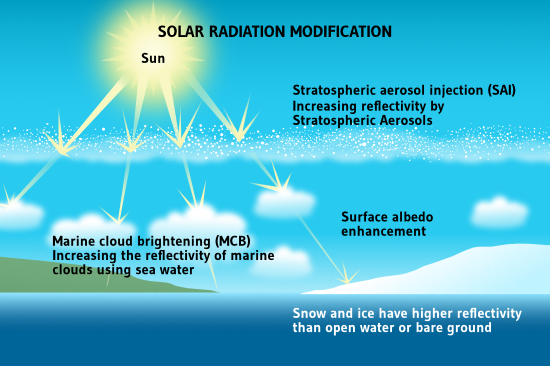Photo: Ilona Mettiäinen.
The Arctic Centre at the University of Lapland is involved in a coordination and support action that will suggest guidelines to support decision-making on research into climate intervention methods by experimental field studies. Funding was awarded by the European Commission's Horizon Programme.
Recent observations show that the world is warming rapidly, and the 1.5°C limit that the Paris Agreement is aiming to limit global warming to, is expected to be exceeded by the end of the decade. The Arctic is critical to the well-being of the Earth’s climate, and is warming far faster than the rest of the planet. Thawing of sea ice, permafrost and the ice sheets mean that many scientists are now focused on ways that these elements might be preserved. Scientists are examining climate intervention methods as potential temporary measures to avoid the most severe impacts until efficient climate change mitigation by greenhouse gas emissions take effect.
Solar radiation modification (SRM) is a group of climate intervention techniques that aim to increase the Earth's reflectivity in order to keep the rise in global temperature temporarily at bay. Methods to reflect sunlight, or increase the Earth's reflectivity (albedo), include spreading reflective aerosols to the upper atmosphere (Stratospheric Aerosol Injection SAI) and marine cloud brightening (MCB).

Illustration: Elina Pätsi.
Mitigation of GHG emissions, including ultimately transitioning away from fossil fuels, is the primary solution to climate change. But SRM may be needed to avoid dangerous climate system tipping points such as irreversible thawing in the Arctic. Before that occurs, it would be prudent to test SRM performance and capabilities, and lower the chance of problematic outcomes, such as unsanctioned deployment. But it is not clear what conditions and governance arrangements are suitable for experimental SRM research to be conducted responsibly, says research professor John Moore from the Arctic Centre of the University of Lapland.
Ethical viewpoints of climate intervention research, including field tests, under consideration
The interdisciplinary Co-CREATE project seeks to help structure this decision problem through co-creative scoping, analysis, and engagement for the development of principles and guidelines including ethical, justice, and public acceptability considerations. The project will propose guidelines and principles to facilitate decision-making by the relevant authorities on broader categories of experimental research of SRM as well as case-by-case decisions.
The Arctic Centre at the University of Lapland will play a key role in several aspects of the project, and in particular in the Arctic case study that runs through the project. Research Professors John Moore and Timo Koivurova and researcher Ilona Mettiäinen are involved in the project. Moore is a glaciologist and climate scientist, Koivurova a legal scholar, and Mettiäinen an environmental social scientist.
– Co-CREATE focuses on the conditions for the acceptability of field studies on sunlight reflection methods from many angles. The project produces guidelines for governance of responsible SRM research including field studies, says researcher Ilona Mettiäinen.
The Co-CREATE project is implemented by a large European consortium led by Perspectives Climate Research from Germany. The consortium includes partners from Finland, Germany, the UK, Italy, France, the Netherlands, Ireland and Poland.
This project has received funding from the European Union’s Horizon Europe research and innovation programme under grant agreement 10113764. The total budget of the project is around €3 million for the period 2024–2026, of which the University of Lapland's contribution is over €264 000.
More information:
Researcher Ilona Mettiäinen
firstname.surname@ulapland.fi